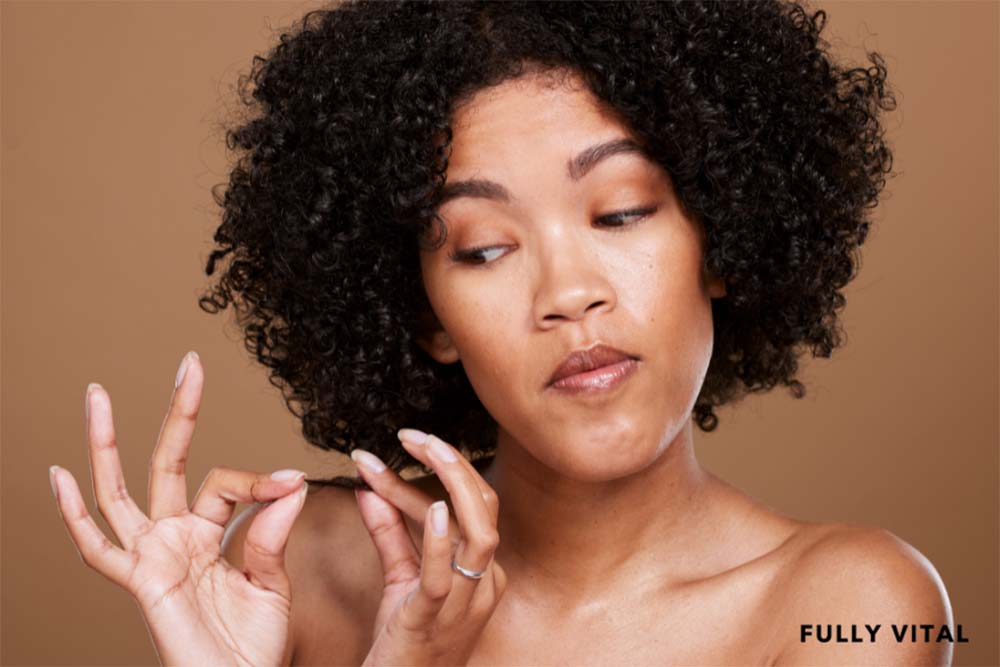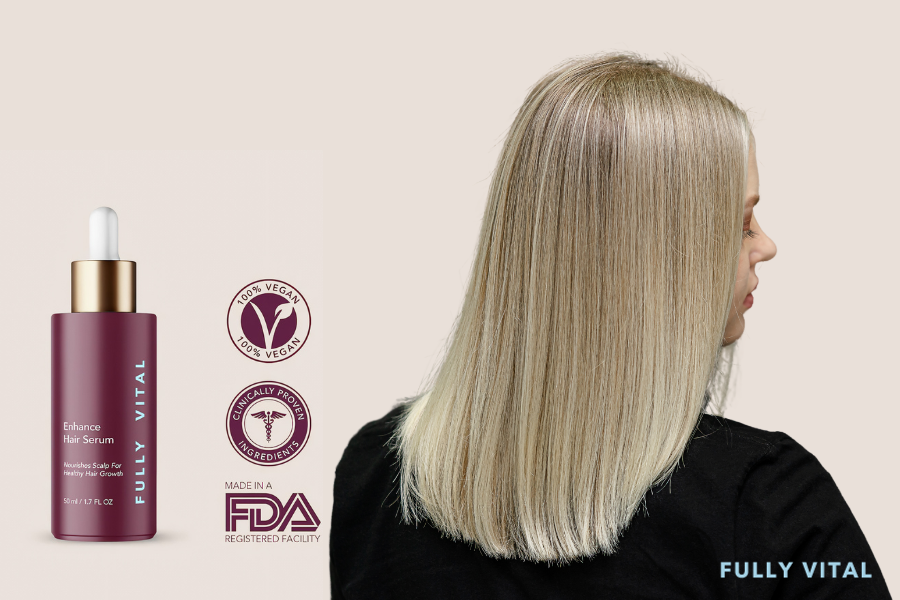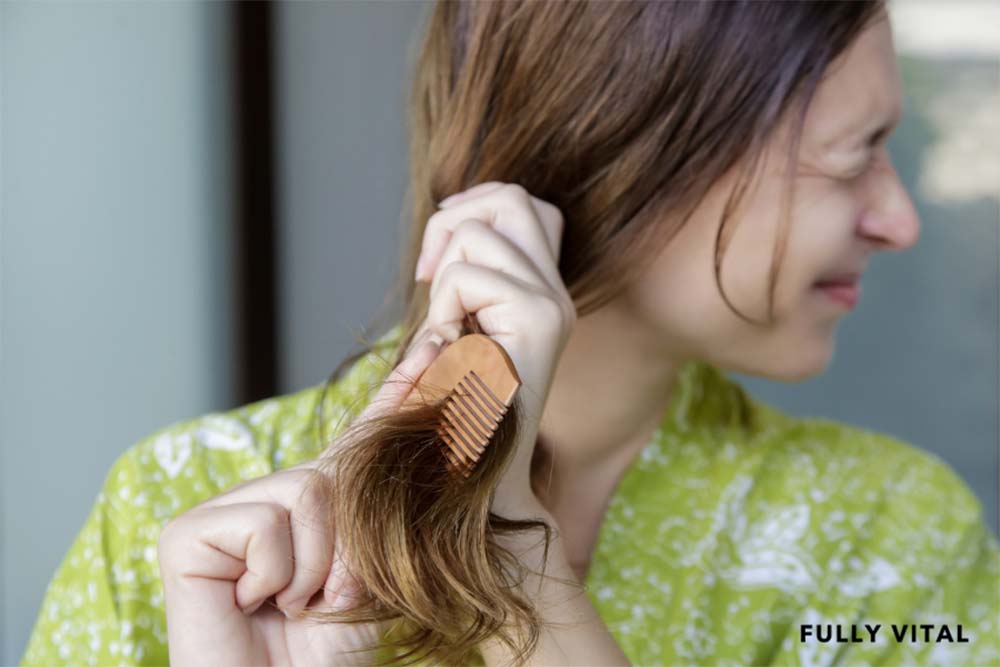
The Ultimate Guide To Hair Density: Everything You Need To Know
A term which often appears in the industry of hair care is "hair density."
If you're on a journey to achieve luscious locks, it's crucial to understand what hair density is, why it matters, and how it works.
In this article, we'll break down the ins and outs of hair density, its importance, benefits, and even explore alternatives.
So, whether you have thin, thick, or somewhere in between hair, let's delve into the world of hair density.

I LOVE MY HAIR NOW
FullyVital hair serum and hair vitamins made tremendous improvements in my hair. I truly love my hair now.
Dorit S.,
What Is Hair Density?
Hair density refers to the number of hair follicles per square inch or centimeter of your scalp.
In simpler terms, it's how many hairs grow on your head.
This factor can vary significantly from person to person, and it plays a vital role in determining the overall appearance and thickness of your hair.

Why Is Hair Density Important?
Understanding the importance of hair density is key to achieving your desired hairstyle.
Hair density affects how your hair looks, feels, and styles.
Here's why it matters:
Appearance
Hair density can make your hair look fuller or thinner.
Higher hair density gives the appearance of thicker and more voluminous locks, while lower density may result in a thinner look.
Styling
Hair density impacts your ability to style your hair.
More hair density provides more options for different hairstyles and looks.
Hair Health
Maintaining the right hair density is often associated with overall hair health. Hair that's too thin or too dense can be a sign of underlying issues that need attention.1
How Does Hair Density Work?
Hair density is primarily determined by genetics.
Your family history plays a significant role in how dense your hair will be.
Additionally, factors such as age, hormonal changes, and certain medical conditions can influence hair density.
Factors Affecting Hair Density:
- Genetics: The most significant factor in determining your hair density is your genetic makeup.
- Age: Hair density can change as you age. It's common for hair to become thinner over time.
- Hormonal Changes: Hormonal fluctuations, such as those experienced during pregnancy or menopause, can affect hair density.
- Health Conditions: Conditions like alopecia and thyroid disorders can impact hair density.
What Are The Benefits Of Hair Density?
Having the right hair density can bring several advantages:
- Increased Volume: Higher hair density can give your hair a fuller and more voluminous appearance.
- Styling Versatility: More hair means more options when it comes to styling your locks.
- Improved Confidence: Achieving your desired hair density can boost your confidence and self-esteem.
Are There Any Downsides To Hair Density?
While there are many benefits to having the right hair density, there can also be some challenges:
- Maintenance: Hair with higher density can require more maintenance and care.
- Heat Sensitivity: Thick hair can be more sensitive to heat, making it prone to damage.
What Are The Alternatives To Hair Density?
If you're looking to enhance your hair's density or address density-related concerns, several options are worth exploring:
Hair Growth Products
There are various hair growth products available, such as shampoos, conditioners, and serums, designed to promote hair growth and improve density.
Hair Extensions
Temporary solutions like hair extensions can provide instant volume and density.
Professional Treatments
Consult with a hair specialist who can recommend treatments like PRP therapy or laser therapy to enhance hair density.
What Is Considered Good Hair Density?
Good hair density is characterized by having a healthy number of hair follicles across your scalp, resulting in hair that appears full, voluminous, and lush.
While there is no one-size-fits-all measurement for what constitutes good hair density, it is often defined by individual factors such as genetics, age, and personal preferences.
For some, good hair density might mean having thick, dense hair, while for others, it could mean maintaining a moderate level of hair fullness that suits their style and appearance.
How Do You Know If You're Losing Hair Density?
Recognizing hair density loss is crucial for taking proactive steps to address the issue.
Here are some common signs that may indicate a decrease in hair density:
- Increased Scalp Visibility: If you can see more of your scalp than usual, it may be a sign of hair density loss.
- Thinning Hair: Hair that appears thinner, flatter, or lacks volume can be an early indicator of density loss.
- Excessive Shedding: If you notice an increase in the amount of hair you're shedding daily, it could be a sign of decreased hair density.
- Widening Part: A widening part, where the gap between individual hairs at the scalp becomes more noticeable, may suggest a decrease in density.
What Changes Hair Density?
Several factors can influence changes in hair density, both positively and negatively.
Understanding these factors can help you maintain or improve your hair density as needed.
Factors That Can Decrease Hair Density:
- Aging: As mentioned earlier, hair naturally thins with age.
- Hormonal Changes: Pregnancy, menopause, and hormonal imbalances can lead to temporary or permanent changes in hair density.2
- Medical Conditions: Conditions like alopecia and thyroid disorders can cause hair loss and density reduction.
Factors That Can Increase Hair Density:
- Healthy Lifestyle: Eating a balanced diet, managing stress, and getting regular exercise can promote hair health and potentially increase density.
- Hair Growth Products: Using specialized hair growth products, such as shampoos and serums, can stimulate hair follicles and encourage growth, potentially improving density.
Can You Increase Hair Density?
Yes, it is possible to increase hair density, but it's essential to have realistic expectations and be patient in your journey to achieve it.
Here are some approaches to consider:
Nutrition
Consume a diet rich in vitamins, minerals, and proteins that support hair growth and overall hair health.
Hair Care Routine
Use hair care products designed to promote growth and thickness, such as shampoos and conditioners with active ingredients.
Scalp Massage
Regularly massaging your scalp can improve blood circulation to the hair follicles, potentially enhancing hair density.
Medical Treatments
Consult with a dermatologist or hair specialist for medical treatments like PRP therapy or laser therapy, which can stimulate hair growth.
How Fast Does Hair Density Grow?
The rate at which hair density grows can vary significantly from person to person and depends on several factors.
On average, hair grows at a rate of about half an inch (1.25 cm) per month.
However, hair density growth is a gradual process, and you may not see noticeable changes for several months.3
Unlock The Secret To Ageless Hair With Fully VitalDiscover the power of science-backed hair growth products that can transform your hair care routine:
Embrace a healthier relationship with your locks. Explore Fully Vital's range of hair growth products and experience the transformation for yourself. Your hair deserves the best, and we're here to deliver it. |
Final Thoughts On Hair Density
Understanding the intricacies of hair density is a vital step on your journey to achieving the luscious locks you desire.
From comprehending what constitutes good hair density to recognizing the signs of density loss and exploring ways to improve it, this knowledge empowers you to make informed decisions about your hair care routine.
At Fully Vital, we're committed to helping you maintain a healthy relationship with your hair.
Our range of hair growth products is designed to combat the effects of aging on your locks, promoting not only increased hair density but also overall hair health.
With the right care and attention, you can enjoy the confidence and satisfaction that comes with having vibrant, voluminous hair.
Remember, the key to achieving and maintaining optimal hair density is consistency and patience.
Whether you're embarking on a journey to enhance your hair density or looking to preserve your current lush locks, we're here to support you every step of the way.
Your hair's vitality is our priority, and together, we can unlock the secrets to a more vibrant and healthier mane.
Frequently Asked Questions About Hair Density
Can I increase my hair density naturally?
Yes, adopting a healthy lifestyle, proper hair care, and using hair growth products can help naturally improve hair density.
Are there any side effects to using hair growth products?
While most hair growth products are safe, it's essential to follow usage instructions and consult with a dermatologist if you have concerns.
Is hair density the same as hair thickness?
No, hair density refers to the number of hair follicles, while hair thickness relates to the diameter of individual hair strands.
Can stress affect hair density?
Yes, chronic stress can contribute to hair loss and impact hair density.
How long does it take to see results from hair growth products?
Results vary from person to person, but it typically takes a few months of consistent use to see noticeable improvements in hair density.
Can hair density increase with age?
While it's natural for hair density to decrease slightly with age, it doesn't mean that you can't maintain healthy hair density as you get older.
By adopting a proactive approach to hair care, including a balanced diet and proper hair care routines, you can help preserve and even improve your hair density over time.
Can hair density decrease after pregnancy?
Yes, it's common for some women to experience temporary hair density loss after pregnancy.
This condition, known as postpartum hair shedding, is usually caused by hormonal fluctuations and typically resolves on its own within a few months.
Is there a specific measurement for good hair density?
No, there's no universal measurement for good hair density because it varies from person to person.
What's considered good density depends on individual factors like genetics, age, and personal preferences.
Can hair density loss be reversed completely?
Hair density loss can often be managed and improved, but complete reversal may not always be achievable.
The success of regrowth treatments depends on factors such as the underlying cause, overall health, and consistency in following recommended treatments.
Are there specific vitamins or supplements that promote hair density?
Several vitamins and supplements are associated with promoting hair health and potentially improving density.
These include biotin, vitamin D, iron, and zinc.
Sources:
- Yetman, D. (2020, October 27). Hair density: How it’s measured, what it means, if you can improve it. Healthline. https://www.healthline.com/health/hair-density
- Hasan, R., Juma, H., Eid, F. A., Alaswad, H. A., Ali, W. M., Aladraj, F. J., Hassan, R., Juma, H., Mohsen, F. A., Alaswad, H. A., Ali, W., & Aladraj, F. (2022). Effects of Hormones and Endocrine Disorders on Hair Growth. Cureus, 14(12). https://doi.org/10.7759/cureus.32726
- How fast does hair grow? Facts and healthy hair growth tips. (2019, October 23). Www.medicalnewstoday.com. https://www.medicalnewstoday.com/articles/326764







